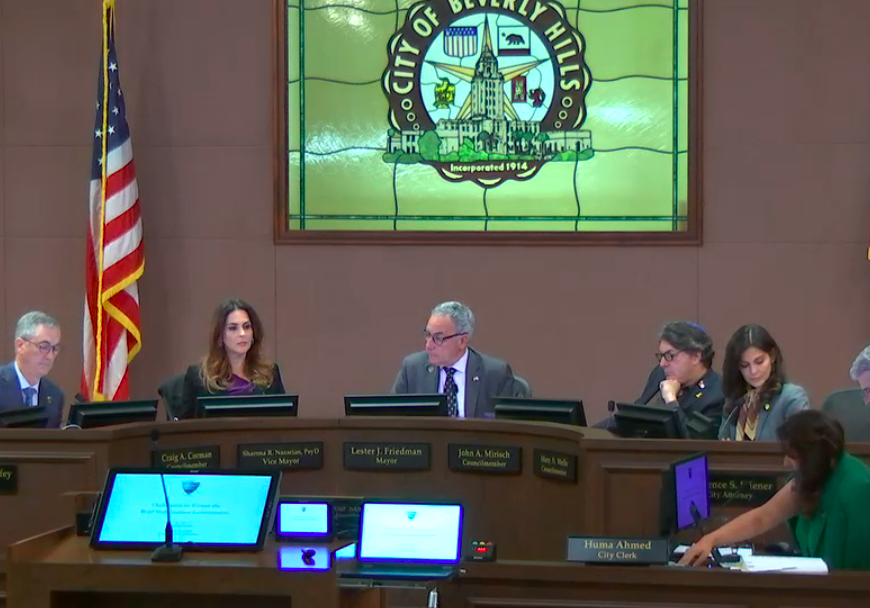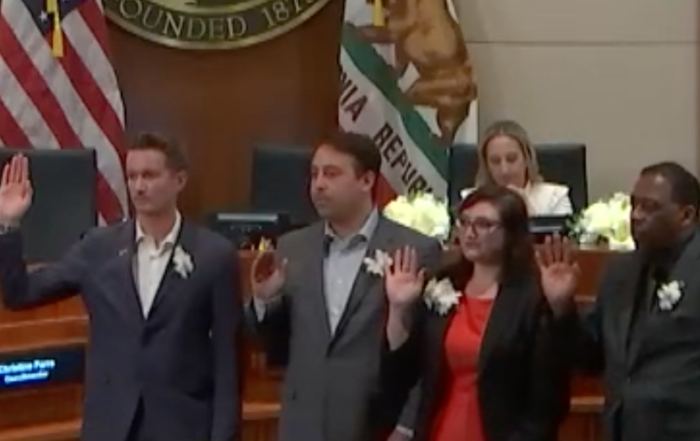On Tuesday night, the Beverly Hills City Council voted to amend a disruptive tenant eviction provision and disband its Rental Stabilization Commission. Renters’ advocates have spoken out against the eviction provision and called for the city to better protect its renters.
Beverly Hills ended no-just-cause evictions for rent-controlled properties in October 2018. Just cause evictions can be at-fault or no-fault. An at-fault eviction can be filed against a tenant who hasn’t paid rent or has broken the rental agreement in some manner. No-fault evictions occur when a landlord takes the unit off the market for various reasons. When landlords file no-fault evictions, they have to pay rent-controlled tenants a relocation fee.
The city adopted the disruptive tenant eviction provision in November 2018 as a concession for landlords unhappy with the end of no-cause evictions. Beverly Hills is the first and only rent-controlled jurisdiction to create a disruptive tenant provision in its municipal code.
If Beverly Hills landlords had to establish just cause, they feared they would be unable to evict what they considered problem tenants. Without no-cause evictions, landlords complained that they would be forced to mount long and costly legal cases.
The city, in response, provided another pathway for landlords to pursue evictions that offered a less cumbersome alternative to court. Since 2018, landlords could have their cases heard by a council subcommittee made up of two council members appointed by the mayor. It was an unusual setup. Now, the council has voted to change the proceedings. Instead of council members, hearing officers will be assigned by the city to oversee these cases.
Council members voted unanimously to amend the provision.
In a June study session, Vice Mayor Sharona Nazarian supported the amendment, saying trained professionals should carry that responsibility instead.
“It is very difficult for a sitting council member to have these types of issues come to them. Our job is not to remove tenants from their homes, especially in this climate,” Nazarian said.
Renters’ rights proponents in Beverly Hills say the disruptive tenant provision itself is unnecessary and likely to make tenants easier to evict. By directing the adjudication of the disruptive tenant evictions through the city council, they argue, tenants at least had some protection.
Of the three disruptive tenant eviction proceedings that have come before the subcommittee since 2018, none have resulted in an eviction.
Mark Elliot, an advocate with the Beverly Hills Renters’ Alliance (BHRA), said council members overseeing disruptive tenant hearings seemed “uncomfortable” and “reluctant to support eviction.”
“That’s why this change is on the agenda,” Elliot said. “It would be good for council members but not good for tenants.”
When the provision was first created in 2018, council members were adamant about the city controlling the implementation of it.
The city was banking on the hope that landlords would opt for a hearing by the city subcommittee rather than going to court. The city subcommittee route would be quicker and comparatively inexpensive for landlords. But landlords could still choose to take the case to court and argue for an eviction under the city’s unique disruptive tenant provision.
City Attorney Laurence Wiener said a judge would likely have trouble understanding the provision as the city intended it, but landlords had the legal right to have their case heard in court.
“I think this will allow a landlord to remove people who should be removed. Is it likely to remove someone who shouldn’t be removed? I suppose that would be in the eye of the beholder,” Wiener said.
This June, when the council announced their intention to amend the provision, Beverly Hills renters reminded them why the subcommittee was formed. Their arguments mirrored the same ones put forth by the council six years ago: a hearing officer unfamiliar with the city’s unique provision might rule against a tenant improperly
On Tuesday, Councilmember John Mirisch raised the same concerns.
“Since we’re now fobbing this off to essentially a bureaucrat, we have to accept that there could be wrong decisions,” Mirisch said.
In the amended provision, the city added language to specify what behavior is deemed disruptive. Tenants who make loud or “unusual” noise, or who “threaten, antagonize, harass, intimidate or bully” other tenants are subject to this provision.
However, critics of the provision argue that it lowers the standard for proving that a tenant is troublesome enough to evict.
California law already allows landlords to evict disruptive tenants, they just go by a different name. They’re called nuisance tenants.
The state code defines a nuisance as “Anything which is injurious to health… or is indecent or offensive to the senses, or an obstruction to the free use of property, so as to interfere with the comfortable enjoyment of life or property.”
In June, Elliot said the city’s provision would enable landlords to evade their responsibilities.
“Nobody should be in the position of throwing out a tenant because of an annoying neighbor or if they bullied a neighbor. There are ways a landlord can deal with that if they want to. Too often I hear about landlords that choose not to,” Elliot said. “We don’t have a disruptive landlord provision, but we need one.”
The definition of a nuisance is backed by case law. It has been put to the test in formal legal settings, unlike the disruptive provision.
In 2018, then Councilmember Lester Friedman said he had a feeling that the case law behind nuisance evictions created a term that was too restrictive to match the city’s intent.
And then there’s the Rent Stabilization Commission (RSC), which the council voted unanimously to dissolve on Tuesday. Most are happy to see it go, even Elliot, who said the commission was doomed from the start. The council created it in 2019 to make recommendations to the council on specific rental issues. The Commission is not a hearing body – they don’t process or make determinations on cases relating to tenant-landlord disputes.
Council members agreed that the commission had completed its work and was no longer needed. The commission had been created for a specific purpose, and that purpose had been fulfilled.
But when the city created the disruptive tenant provision in 2018, they envisioned that those cases would eventually be heard by the commission rather than a council subcommittee. Over time, the commission proved too challenging to maintain. The city’s requirements for appointment to the commission made it difficult to fill vacancies and reach quorum, said Director of Community Development Michael Forbes.
Mayor Friedman said the city would set up another system for landlords and tenants to discuss disputes, though specific plans for that system were not discussed. The city has no committee dedicated to renters’ issues.
To some, the elimination of the commission, justified or not, is more evidence of the city’s abandonment of renters.
Over the summer, renters testified to the council about the abysmal state of the rental market and the lack of protections for tenants. They spoke of hostile and intimidating landlords, uninhabitable apartments, and most pertinently, city employees that couldn’t or wouldn’t help them or enforce building codes.
Renter Susanna Nixon told the council in September that her landlord was blatantly trying to force her out of her unit and “Taking advantage of the city’s lack of enforcement and oversight.” She asked the council why the municipal codes existed if the city wouldn’t enforce them.
“The city must hold these negligent landlords accountable and protect renters from this kind of exploitation,” Nixon said.
Elliot said it was difficult for renters to get any help from the Beverly Hills Rent Stabilization Division.
“It seems like there is a crisis in that division,” he said. “We are not seeing any evolution in rent stabilization. My concern is that rent stabilization here is going away.”
Image obtained by screen capture.
Stay informed. Sign up for The Westside Voice Newsletter
By clicking submit, you agree to share your email address with Westside Voice. We do not sell or share your information with anyone.








